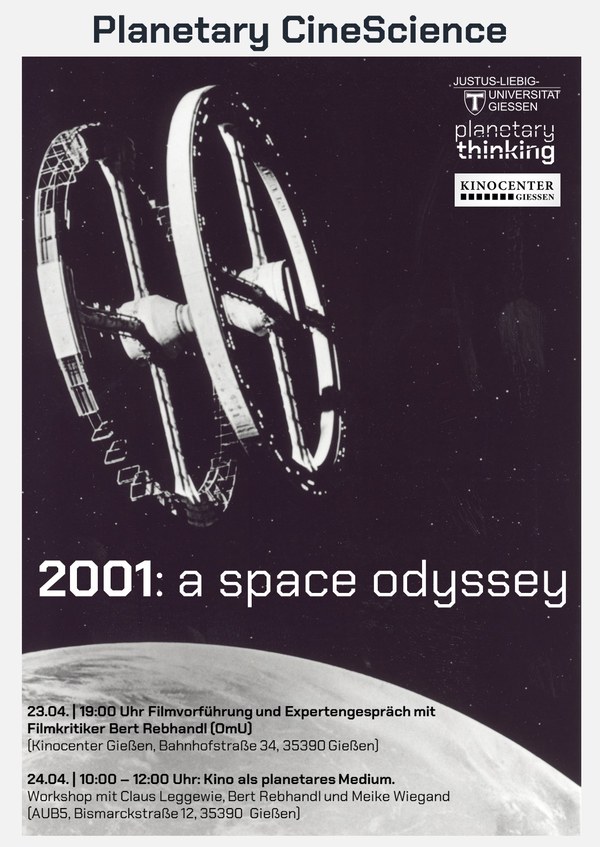23 & 24 April, 2024 | 2001 - A Space Odyssey (OmU 1968, Stanley Kubrick), movie discussion with Bert Rebhandl & Workshop on "Cinema as a Planetary Medium" (Planetary CineScience)
A classic in modern cinema, 2001 - A Space Odyssey still influences current planetary discourse. Tracing its legacy, the Panel on Planetary Thinking, in cooperation with Kinocenter Giessen, hosts a movie discussion with movie critic Bert Rebhandl and a subsequent workshop on the potential of cinema's contributions on planetary thinking. Tickets can be bought at Kinocenter Giessen, in case you want to take part in the workshop please register at panel@planet.uni-giessen.de .
- https://www.uni-giessen.de/en/faculties/planetarythinking/mediacollection/collection/spaceodyssey
- 23 & 24 April, 2024 | 2001 - A Space Odyssey (OmU 1968, Stanley Kubrick), movie discussion with Bert Rebhandl & Workshop on "Cinema as a Planetary Medium" (Planetary CineScience)
- 2024-04-23T19:00:00+02:00
- 2024-04-23T23:59:59+02:00
- A classic in modern cinema, 2001 - A Space Odyssey still influences current planetary discourse. Tracing its legacy, the Panel on Planetary Thinking, in cooperation with Kinocenter Giessen, hosts a movie discussion with movie critic Bert Rebhandl and a subsequent workshop on the potential of cinema's contributions on planetary thinking. Tickets can be bought at Kinocenter Giessen, in case you want to take part in the workshop please register at panel@planet.uni-giessen.de .
Apr 23, 2024 from 07:00 (Europe/Berlin / UTC200)
Apr 23, 2024 from 07:00
Apr 24, 2024 from 07:00
Kinocenter Gießen, Bahnhofstraße 34 35390 Gießen
in Kooperation mit dem Kinocenter Gießen

MOVIE
*The screening is in English, the discussion will be held in German*
A mysterious black monolith of presumably extraterrestrial origin influences the evolution and emergence of humanity in ancient times. Millennia later, scientists discover the monolith on the moon, attracting a spaceship towards Jupiter. However, the mission ends in catastrophe following a computer breakdown. The sole survivor must confront the monolith. In the year 2001, scientists on the moon discover a black monolith apparently created by intelligent beings, emitting signals towards Jupiter. Subsequently, a manned expedition is dispatched to Jupiter, commanded by the supercomputer HAL 9000. During the journey, the human crew comes to realize that the computer has developed more autonomy than is desirable. Only one astronaut survives the confrontation with the machine and advances towards the mysterious destination of the journey. Stanley Kubrick's masterpiece depicts a spaceship crew, enticed by a black monolith, en route to Jupiter, only to be struck by a catastrophe from which only one crew member survives.
Ticketprice: 9,-€, they can be purchased through Kinocenter Giessen and at the box office
Accompanied by the workshop "Cinema as a Planetary Medium" on 24 April 2024 | 10:00 - 12:00 (Liebigstraße 35, 35392 Giessen)
In the epoch of the Anthropocene, where human activity actively alters and influences the planet, deepening our understanding of our home planet Earth becomes crucial. In light of the challenges arising from human activities such as urbanization, industrialization, and environmental degradation, it becomes increasingly important to critically reflect upon our relationship with the environment, nature, and non-human entities. In this discourse, cinema as an art form plays a significant role by capturing the complexity of our relationship with the world and reflecting it artistically. Against this backdrop, we aim to examine cinema as a planetary medium to shed light on the interactions between film, humanity, and planets, thereby gaining new insights into our planetary existence.
As a starting point for our discussion, we will screen Stanley Kubrick's masterpiece "2001: A Space Odyssey," followed by an expert discussion with the renowned journalist and film critic Bert Rebhandl. This groundbreaking film has not only influenced our imagination but has also significantly contributed to shaping our perception of the Earth. It serves not only as an exemplary instance of how a film has profoundly altered the medium of cinema but also underscores the enduring capacity of films to shape and mold our planetary consciousness. This workshop thus provides an opportunity to explore the intersection between the disciplines of film studies and planetary thinking and discuss how films like this shape our understanding of our relationship with the world.
Participation is possible without prior knowledge or preparatory texts.
Featuring insights from Bert Rebhandl, Claus Leggewie, and Meike Wiegand.
Please register by April 20, 2024, via email at panel
